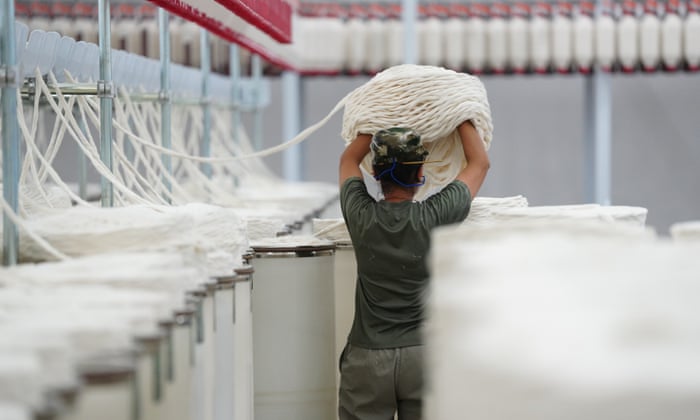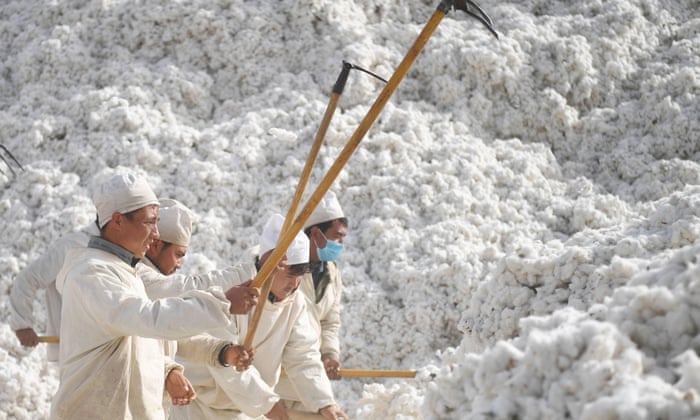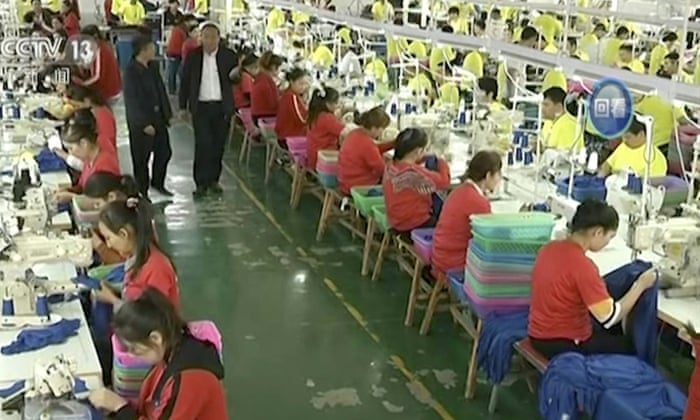China Maximizing Its WorkForce
"This evidence underlines why businesses must urgently end all sourcing from the region, and why governments must ban imports from the region.""There are no arguments for delay."Chloe Cranston, Anti-Slavery International campaign group"Some minorities may exhibit a degree of consent in relation to this process, and they may benefit financially.""However ... it is impossible to define where coercion ends and where local consent may begin."Adrian Zenz, author, Center for Global Policy report, Washington"In all, ASPI’s research has identified 82 foreign and Chinese companies potentially directly or indirectly benefiting from the use of Uyghur workers outside Xinjiang through abusive labour transfer programs as recently as 2019: Abercrombie & Fitch, Acer, Adidas, Alstom, Amazon, Apple, ASUS, BAIC Motor, Bestway, BMW, Bombardier, Bosch, BYD, Calvin Klein, Candy, Carter’s, Cerruti 1881, Changan Automobile, Cisco, CRRC, Dell, Electrolux, Fila, Founder Group, GAC Group (automobiles), Gap, Geely Auto, General Motors, Google, Goertek, H&M, Haier, Hart Schaffner Marx, Hisense, Hitachi, HP, HTC, Huawei, iFlyTek, Jack & Jones, Jaguar, Japan Display Inc., L.L.Bean, Lacoste, Land Rover, Lenovo, LG, Li-Ning, Mayor, Meizu, Mercedes-Benz, MG, Microsoft, Mitsubishi, Mitsumi, Nike, Nintendo, Nokia, Oculus, Oppo, Panasonic, Polo Ralph Lauren, Puma, SAIC Motor, Samsung, SGMW, Sharp, Siemens, Skechers, Sony, TDK, Tommy Hilfiger, Toshiba, Tsinghua Tongfang, Uniqlo, Victoria’s Secret, Vivo, Volkswagen, Xiaomi, Zara, Zegna, ZTE. Some brands are linked with multiple factories."Australian Strategic Policy Institute
 |
| The coalition says workers face ‘vicious retaliation’ if they tell the truth about their employment conditions. Photograph: VCG/Getty Image |
Hundreds of thousands of ethnic Uyghurs along with other minority groups are being forced to pick cotton by hand, according to a U.S.based think-tank, in a report that has triggered calls on governments to ban cotton imports from the Xinjiang region of China. Roughly eleven million ethnic Uyghurs call the huge western Chinese Province their ancestral home, where they produce 85 percent of China's cotton, representing 20 percent of global supply, linked to worldwide fashion brands.
The report emphasizes the likelihood of a major proportion of cotton from Xinjiang was "tainted with forced labour". To which China's foreign ministry responds, in dismissing the allegations: "Helping people of all ethnic groups secure stable employment is entirely different from 'forced labour." According to spokesperson Wang Wenbin close to three million people in the region have been lifted out of poverty; a claim difficult to challenge or to dispel.
 |
| Workers at a cotton factory in Awat county, in China’s Xinjiang region. Photograph: Xinhua/Alamy |
There have been undeniably, long-standing concerns within the international community over reports of a million people from Muslim minorities detained in camps situated in Xinjiang where they have undergone re-education workshops, and are then assigned to work in textile factories. The camps themselves, explains China in its defense, to an outraged world are vocational training centres and their purpose is that of fighting extremism. In other words, without China's official intervention to re-educate Uyghurs, they become terrorists.
The ILO [International Labour Organization] lists 11 indicators of forced labour. Relevant indicators in the case of Uyghur workers may include:
Australian Strategic Policy Institute
- being subjected to intimidation and threats, such as the threat of arbitrary detention, and being monitored by security personnel and digital surveillance tools
- being placed in a position of dependency and vulnerability, such as by threats to family members back in Xinjiang
- having freedom of movement restricted, such as by fenced-in factories and high-tech surveillance
- isolation, such as living in segregated dormitories and being transported in dedicated trains
- abusive working conditions, such as political indoctrination, police guard posts in factories, ‘military-style’ management, and a ban on religious practices
- excessive hours, such as after-work Mandarin language classes and political indoctrination sessions that are part of job assignments.
The Muslim world appears to tacitly agree for there have been no questions emanating from any Muslim country over the allegations, and no protests directed toward China from Muslim sources that usually speak up against prejudice targeting those faithful to Islam elsewhere in the world, just as there was little interest from the same sources in the plight of Rohingya Muslims in Myanmar.
Yet according to the Center for Global Policy, Chinese government documents and media reports indicate some 570,000 people, representing three Xinjiang regions, have been sent to pick cotton through a coercive labour program meant to target ethnic minority groups -- adding that the true figure ensnared in slave labour conditions was certain to be higher than that stated by several hundred thousand.
"In March 2020, the Australian Strategic Policy Institute (ASPI) published a report Uyghurs for sale: ‘Re-education’, forced labour and surveillance beyond Xinjiang, which identified 83 foreign and Chinese companies as allegedly directly or indirectly benefiting from the use of Uyghur workers outside Xinjiang through potentially abusive labour transfer programs.""ASPI estimates at least 80,000 Uyghurs were transferred out of Xinjiang and assigned to factories in a range of supply chains including electronics, textiles, and automotives under a central government policy known as ‘Xinjiang Aid’. The report identified 27 factories in nine Chinese provinces that are using Uyghur labour transferred from Xinjiang since 2017.""ASPI reached out to the 83 brands to confirm their relevant supplier details. Where companies responded before publication, they have included their relevant clarifications in their report.""Business & Human Rights Resource Centre invited Abercrombie & Fitch, adidas, Amazon, BMW, Gap, H&M, Inditex, Marks & Spencer, Nike, North Face, Puma, PVH, Samsung and UNIQLO to respond; the[y responded]. We invited Apple, Esprit, and Fila to respond; they did not. L Brands sent its response after publication of our Weekly Update, in October 2020."Business & Human Rights Resource Centre
 | |
| In this undated video footage run by China’s CCTV, Muslim trainees work in a garment factory at the Hotan Vocational Education and Training Centre in Hotan, Xinjiang. Photograph: AP Video |
Labels: Beijing, Chinese Communist Party, Forced Labour, Uyghurs, Xinjiang Region

0 Comments:
Post a Comment
<< Home